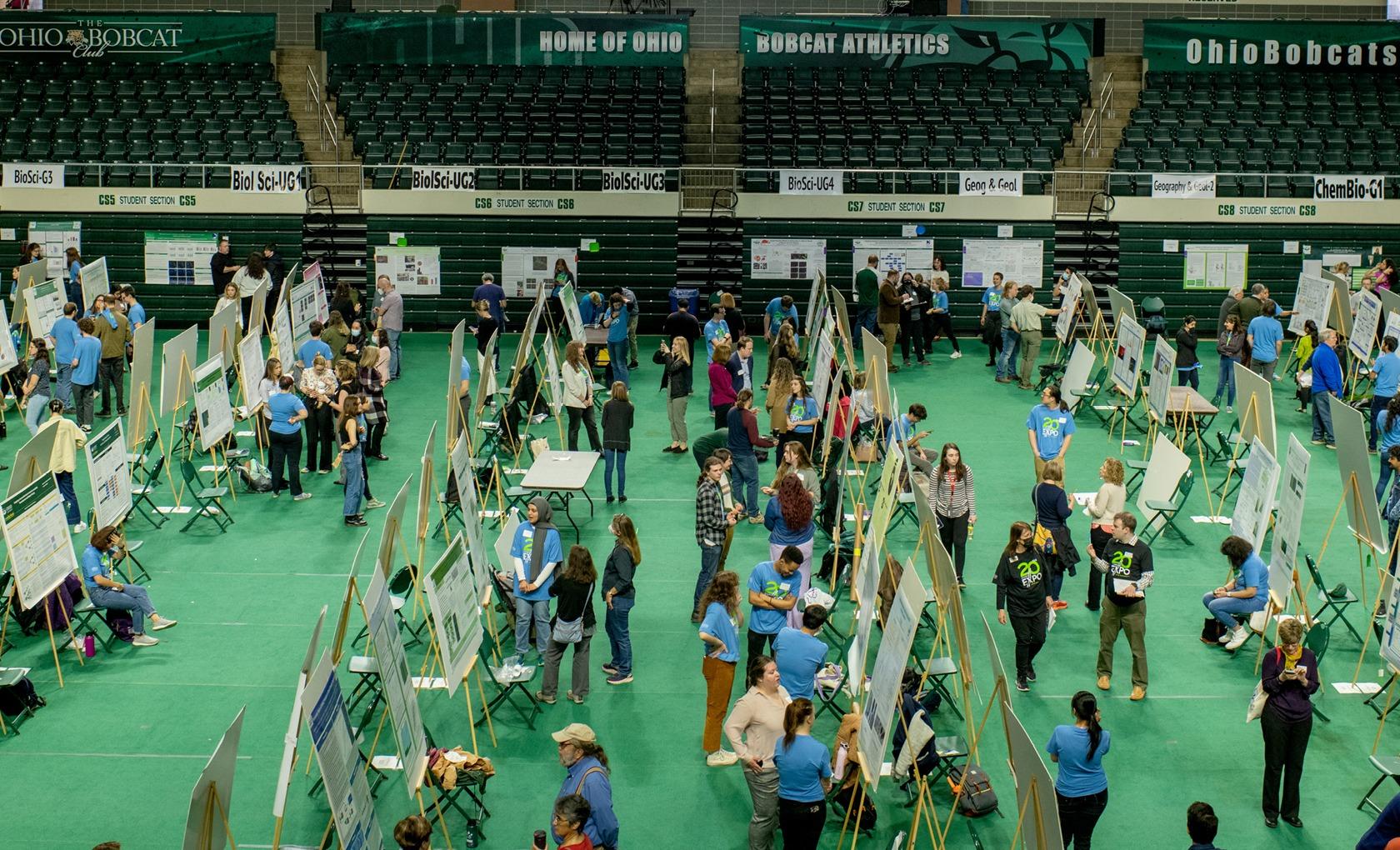
Time Machine: OHIO's Student Expo
On April 7, OHIO celebrated its 20th Student Expo following two fully virtual events in 2020 and 2021. This year’s Expo was offered in a hybrid format—a first for an event that for 20 years has provided OHIO students an opportunity to showcase their innovation, discovery and imagination.
Anita Martin, BSJ ’05 | October 7, 2022
Share:
As Lily Gelfand, BFA ’18, set up at Ohio University’s Student Research and Creative Activity Expo sophomore year, she felt a twinge of imposter syndrome. “I saw these science folks with all their numbers and felt like, should I be here? Then I talked myself down like: No, research in the arts is just as valuable.”
Gelfand plugged her cello mic into an amplified looper pedal and got to work, improvising dance tracks—tapping the body of her cello, plucking and bowing its strings—while fellow Honors Tutorial College dance major, Matthew Keller, BFA ’17, performed. She left the Expo with a first-place award and a rush of confidence.
Today, Gelfand packs her looper pedal—the same one she used at the Expo—and mic and grabs her cello every day to either rehearse at David Dorfman Dance or accompany dance classes at The Juilliard School in New York City. Her OHIO Student Expo project helped nurture her budding creativity into an innovative arts career.
Gelfand is among thousands of Bobcats to present original research and creative activity at the Expo. The event, which at its pre-COVID peak was among the nation’s largest student showcases, dates back to 2002.
On April 7, OHIO celebrated its 20th Student Expo following two fully virtual events in 2020 and 2021. This year’s Expo was offered in a hybrid format—a first for an event that for 20 years has provided OHIO students an opportunity to showcase their innovation, discovery and imagination.
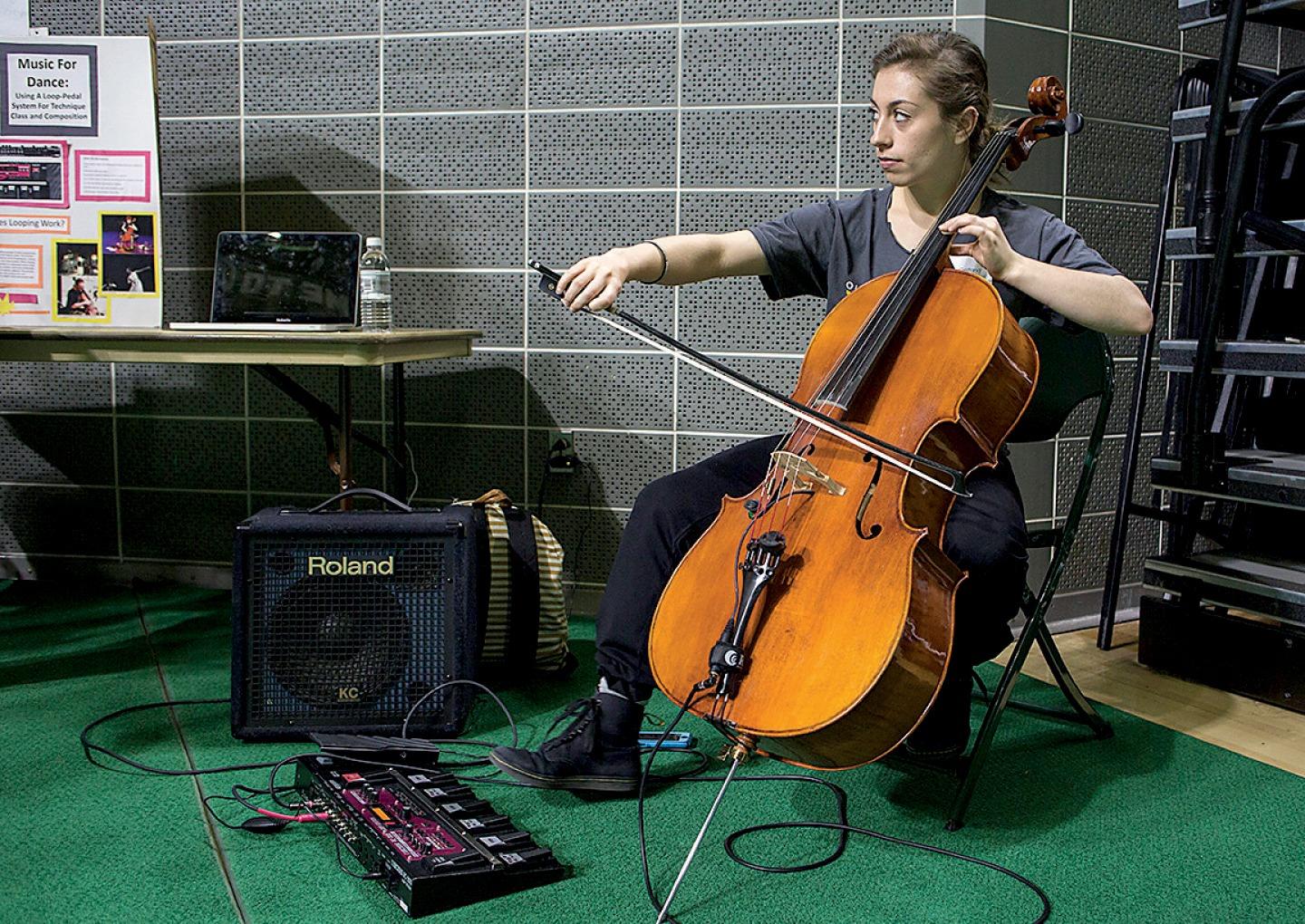
Lily Gelfand, BFA ’18 (HTC), demonstrates how to use a looper pedal system at the 2016 Student Expo. She uses the same looping pedal in her work today. Photo by Emily Matthews, BSVC ’18
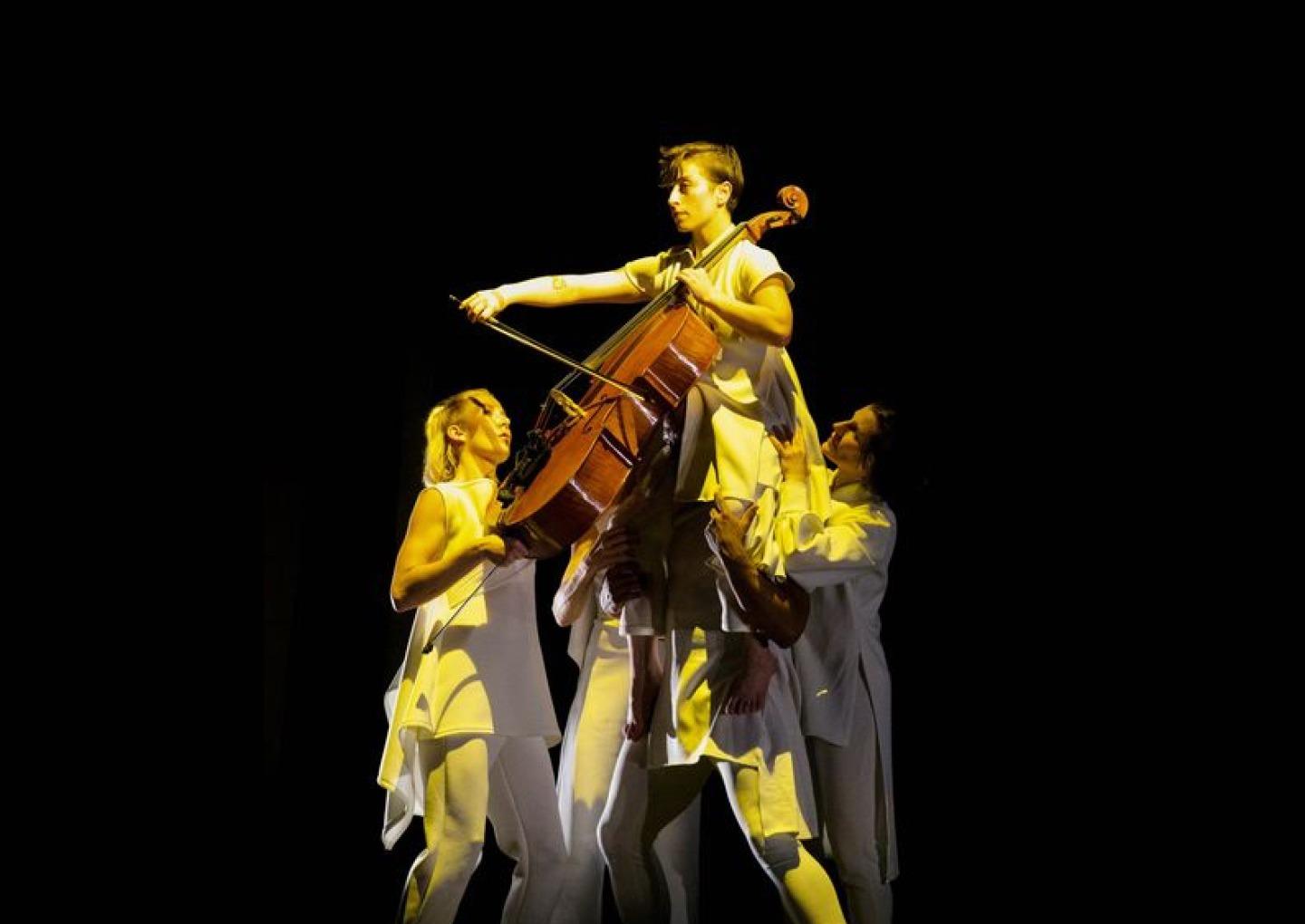
Lily Gelfand, BFA ’18, pictured here playing her cello, is a core dancer at David Dorfman Dance, a dance accompanist at The Juilliard School and a yoga teacher in New York City. Photo provided by Lily Gelfand
Fruitful beginnings
The dawn of the 21st century spurred individuals and institutions to redefine visions, till old grounds and plant new seeds. OHIO resolved to cultivate more undergraduate research and creativity, expanding funding for student innovation in 1999. By spring 2002, these efforts germinated with the first Student Expo.
“The very first Expo was in the ballroom of the old Baker Center,” recalls Dr. Roxanne Malé-Brune, director of grant development and projects in OHIO’s Graduate College. “I think it was just 14 Student Enhancement Award winners, across several disciplines.”
Malé-Brune joined OHIO in the summer of 2001, charged with establishing and directing OHIO’s Office of Grant Development and coordinating this new event, which she has continued for the past 20 years. For her, the Expo’s primary goal is simply to “celebrate student research and creative activity.”
“We would love to send all our students to conferences, performances and exhibits, but that’s not realistic,” says Malé-Brune. “But we can give them the opportunity to present to the University and greater community—to show off what they can do and explore new ideas.”
Malé-Brune designed the Expo to cross-pollinate innovative thinking by “intentionally intermingling disciplines. You might have media arts next to physics,” she explains. “They end up talking to each other; that’s a totally different way for any researcher or artist to communicate.”
As the gardening adage goes: sleep, creep, leap. The quiet gathering of student presenters expanded to include graduate student grantees and was relocated to the much larger Convocation Center.
In 2004, faculty suggested opening the Expo to all students, and “it just exploded from there,” says Malé-Brune. Soon, the event was bringing in community guests and “hundreds of middle school and high school student attendees, some of them coming from an hour and a half away.”
“By 2013, we were already above 500 [presentations],” Malé-Brune says. “It peaked in 2018 at 905 presentations.”
Festival feel
By this point, the Expo “felt just like a festival” to student researchers like Pengfei “Phil” Duan, MS ’11, PHD ’18, who studied electrical engineering through OHIO’s Russ College of Engineering and Technology. He recalls his excitement as the streets around the Convo and Stocker Center lined with cars and people. For Duan, the event pulled him out of his daily lab grind, exposing him to an “inspiring” range of student work.
Over the course of his six years at OHIO, Duan presented at the Expo three times, twice with a team of engineering students showcasing a robot they constructed for an annual Institute of Navigation Autonomous Snowplow Competition—which they won both times. On a screen, the team demonstrated how its robotic snowplow used sensors and algorithms to “see” and navigate its surroundings independent of human operators.
Expo attendees can still expect anything from autonomous robots to live accompanied dance performances—and everything in between.
“We’ve had virtual reality, drones, barbershop quartets. One year we had an amusement park ride,” Malé-Brune says, recalling an interactive prop similar to a Tilt-A-Whirl™ created by School of Theater students. “We had to figure out a special power supply [for that].”
From the Expo’s beginning, Malé-Brune encouraged an experimental, playful approach.
“I made the decision early on to go beyond your standard poster fair. I don’t want to limit a student’s creativity or passion, within reason,” she quips. “If students ask to blow up balloons, my response is, ‘Hydrogen or helium? What’s your vision? Just be safe.’”
Passion for the event goes beyond students to faculty and staff. “We have professors who have been involved since the beginning,” adds Malé-Brune. “University Libraries co-sponsors the Expo. They pay for the T-shirts, give awards and staff serve as judges. Now, University Libraries’ OHIO Open Library is serving as a repository for some of the Expo’s displays, allowing that student work to be accessed globally.”
Student success behind the scenes
Reflecting on 20 years of Expo success, Malé-Brune credits exceptional student leadership.
“The Expo is run almost exclusively by students,” she says. “They coordinate everything from promotions all the way through logistics and execution.”
After the abrupt COVID shutdown in 2020, Malé-Brune’s student leaders revived the Expo as a virtual event. “We had less than one month to put together a virtual event,” Malé-Brune recalls. Luckily, her savvy students had already launched social media accounts for the Expo.
That year, 352 student researchers presented projects on Twitter and Instagram accounts @BobcatsDiscover, also posting their projects on private social media accounts using the hashtag #OUVirtualExpo.
“At the [in-person] Expo, you’ll present to maybe 50 people,” Malé-Brune notes. “But on social media, we had tens of thousands of impressions across posts. We had videos with over 500 likes. Even the lieutenant governor commented on our posts!”
The 2021 virtual event added a further way to participate, encouraging students to submit videos for judging and awards. That year participation remained steady at 350 presenters, plus 142 video submissions for awards.
![Pengfei “Phil” Duan, MS ’11, PHD ’18, [SECOND FROM LEFT] and a team of fellow engineering students show off their robotic snowplow at the 2012 Student Expo. Photo by Wayne Thomas, MA ’12](https://www.ohio.edu/sites/ohio.edu.news/files/2024-02/Fall-OT-images-223.jpg)
Pengfei “Phil” Duan, MS ’11, PHD ’18, [SECOND FROM LEFT] and a team of fellow engineering students show off their robotic snowplow at the 2012 Student Expo. Photo by Wayne Thomas, MA ’12
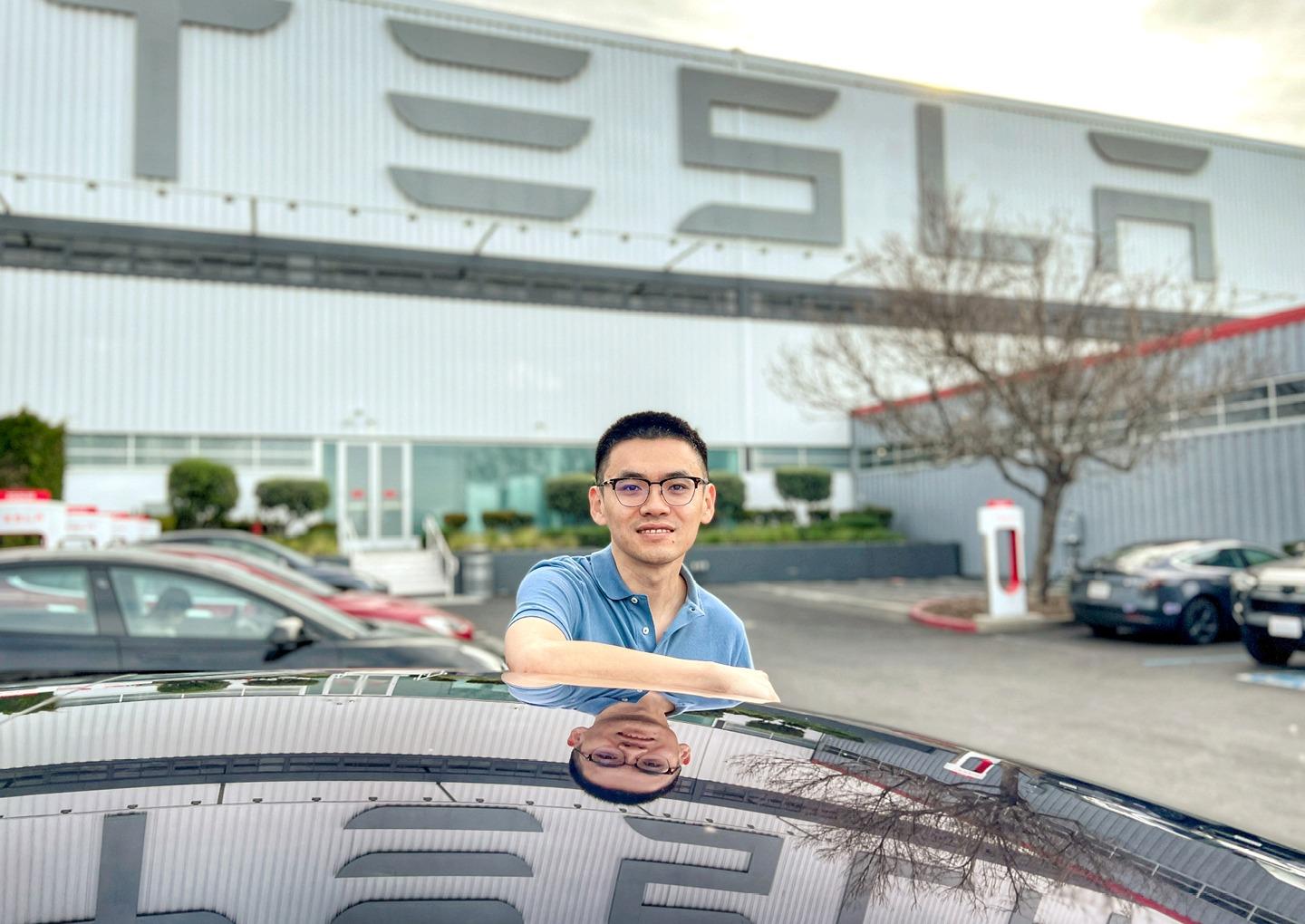
Pengfei “Phil” Duan, MS ’11, PHD ’18, is pictured outside Tesla offices in Silicon Valley, California, where this two-time Ohio University Russ College of Engineering and Technology alumnus leads one of the teams working on the company’s autopilot project. Photo by Christopher Polydoroff, MA ’87
Lines of growth
Due to ongoing COVID precautions, the University limited registration for this year’s 20th Expo. This return to an in-person event was marked by “the joyfulness of coming back together,” says Malé-Brune.
The smaller live attendance—534 presenters and 368 presentations—recalled the earlier years of the Expo. Except this time, the event also featured more than 100 digital-only participants posting about the #OUStudentExpo on @BobcatsDiscover platforms and elsewhere, plus students who did both. This hybrid approach enhanced student involvement across OHIO—from the Athens Campus to three regional campuses and the Heritage College of Osteopathic Medicine’s Cleveland and Dublin campuses.
Alumni engagement has also grown, according to Malé-Brune. “I think [OHIO graduates] relive the passion of why they connected with Ohio University,” she says. “Many serve as judges for awards, plus we have alums—for example, at Honda—who come to recruit students for jobs and internships.”
In addition to event-wide discipline-based awards at the Expo, several campus partners run special sessions. These include the Edison Biotechnology Institute, the Diabetes Institute, the Appalachian Rural Health Institute, the Office of Sustainability, the Center for Campus and Community Engagement, the Office for Multicultural Success and Retention, Regional Campuses, Honors Tutorial College, University Libraries, Graduate Student Senate, Sigma Xi and University International Council. The Center for Entrepreneurship even runs a pitch competition called the Expo Impact Prize, modeled, in part, after the show Shark Tank .
“This year, the competition had VIP alums who are successful entrepreneurs come in to serve as the ‘sharks.’ Six students garnered funds to enhance their projects, including one student who received an investment of $5,000,” says Malé-Brune.
“Students are doing impressive work investigating big issues like treating and curing diseases, climate change, human rights, novel forms of entertainment and so much more,” says Paul Benedict, AB ’96 (HTC), director of OHIO’s Center for Entrepreneurship. “Our alums always enjoy engaging with students this way—and often find it humbling. The goal of the Expo Impact Prize is to help students take their work beyond the University to make an impact on peoples’ lives and in their communities.”
This level of University support has increased student research at OHIO.
“We track the number of undergraduates who do research and creative activity, and over the last 10 years, that number has tripled ,” Malé-Brune notes, adding that engaging in research can jump-start amazing careers.
Duan, for example, won awards at every Expo he participated in, including a first-place award for research on aviation safety he conducted with the NASA Langley Research Center in Virginia. That work informed his dissertation, which landed him the William E. Jackson Award, presented annually by the premier aviation association, RTCA, to recognize the nation’s leading graduate student in aviation electronics and telecommunications.
Today, Duan is a software engineer at Tesla, leading one of the electric vehicle company’s autopilot teams. All of his Expo presentations involved autonomous systems.
“Now,” he explains, “I'm working on fully autonomous vehicles. There’s a lot of transferable skills and technical details, including the mindset of safety and the critical thinking, I developed at OU.”
For Malé-Brune, stories like Duan’s and Gelfand’s illustrate the vital impact of student research and creative activity. “It’s test-driving your career choice, taking what you learn in the classroom and applying it to a real-world problem. These students come into a lab or studio knowing a little, and by the time they leave, they might be one of the world’s experts in their particular area.”
Feature photo: Student Expo 2022. Photo by Rich-Joseph Facun, BSVC ’01
![Huafeng Liu, BSEE’15, [RIGHT] explains the tricopter design his team built to classmates at the 2014 Student Research and Creative Activity Expo. Photo by Jonathan Adams](https://www.ohio.edu/sites/ohio.edu.news/files/2024-02/Fall-OT-images-229.jpg)
Huafeng Liu, BSEE’15, [RIGHT] explains the tricopter design his team built to classmates at the 2014 Student Research and Creative Activity Expo. Photo by Jonathan Adams
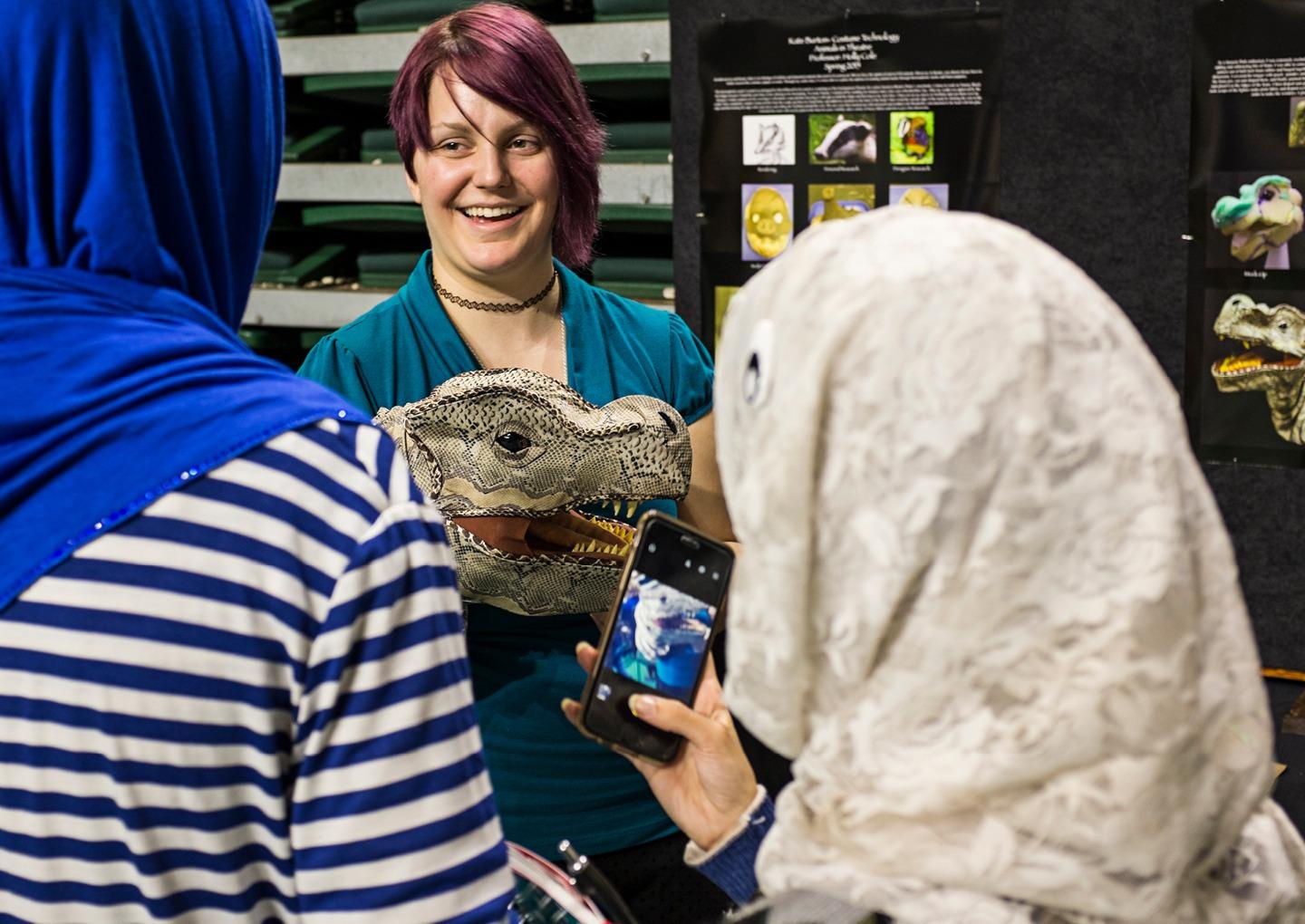
First-year MFA theater student Kate Burton shares her process for building a dinosaur puppet during the 2015 Student Expo. Photo by Rob Hardin
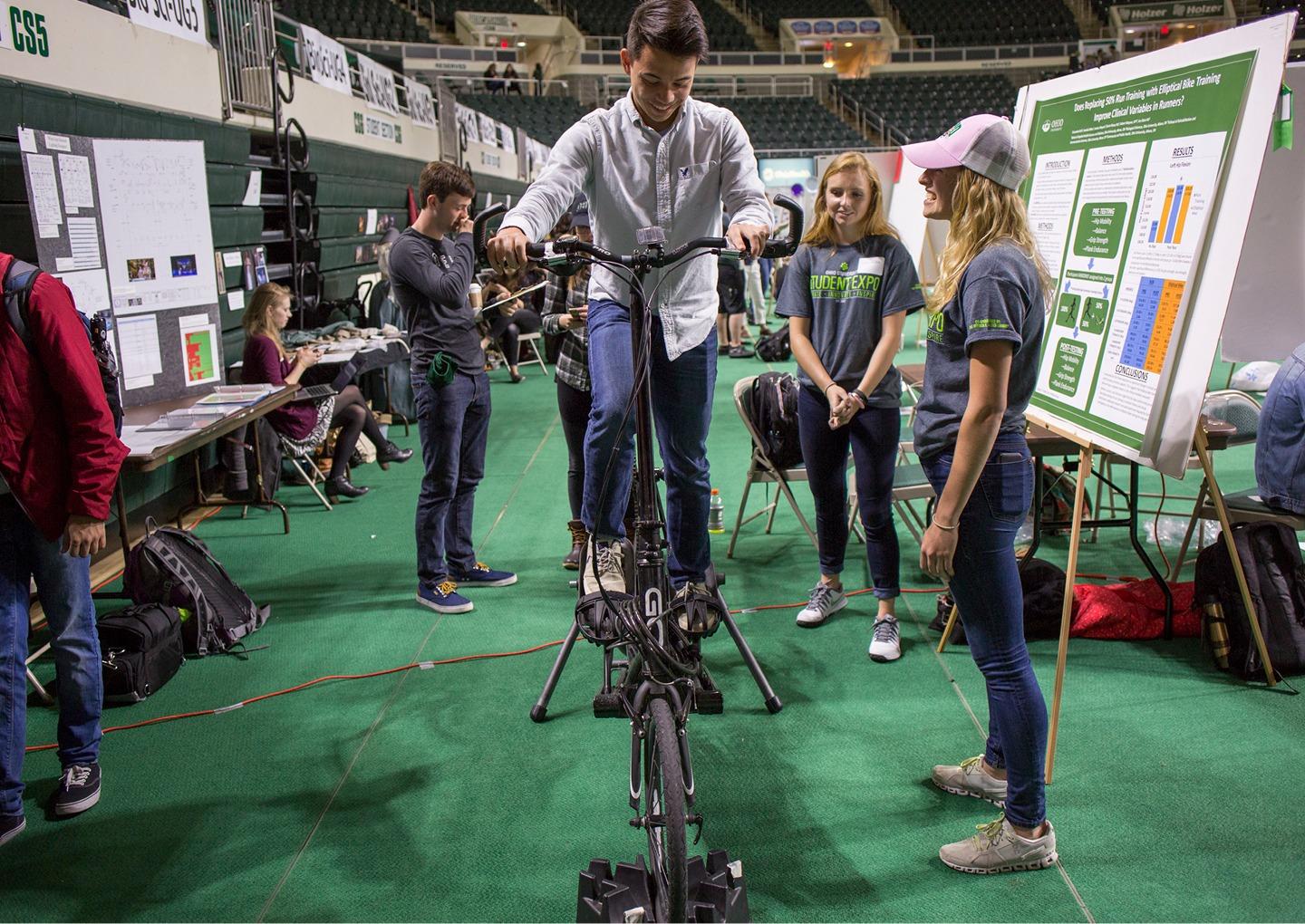
Caedon Ly, a junior at Logan High School, tries out an elliptical bike at the 2017 Student Expo. Photo by Emily Matthews, BSVC '18
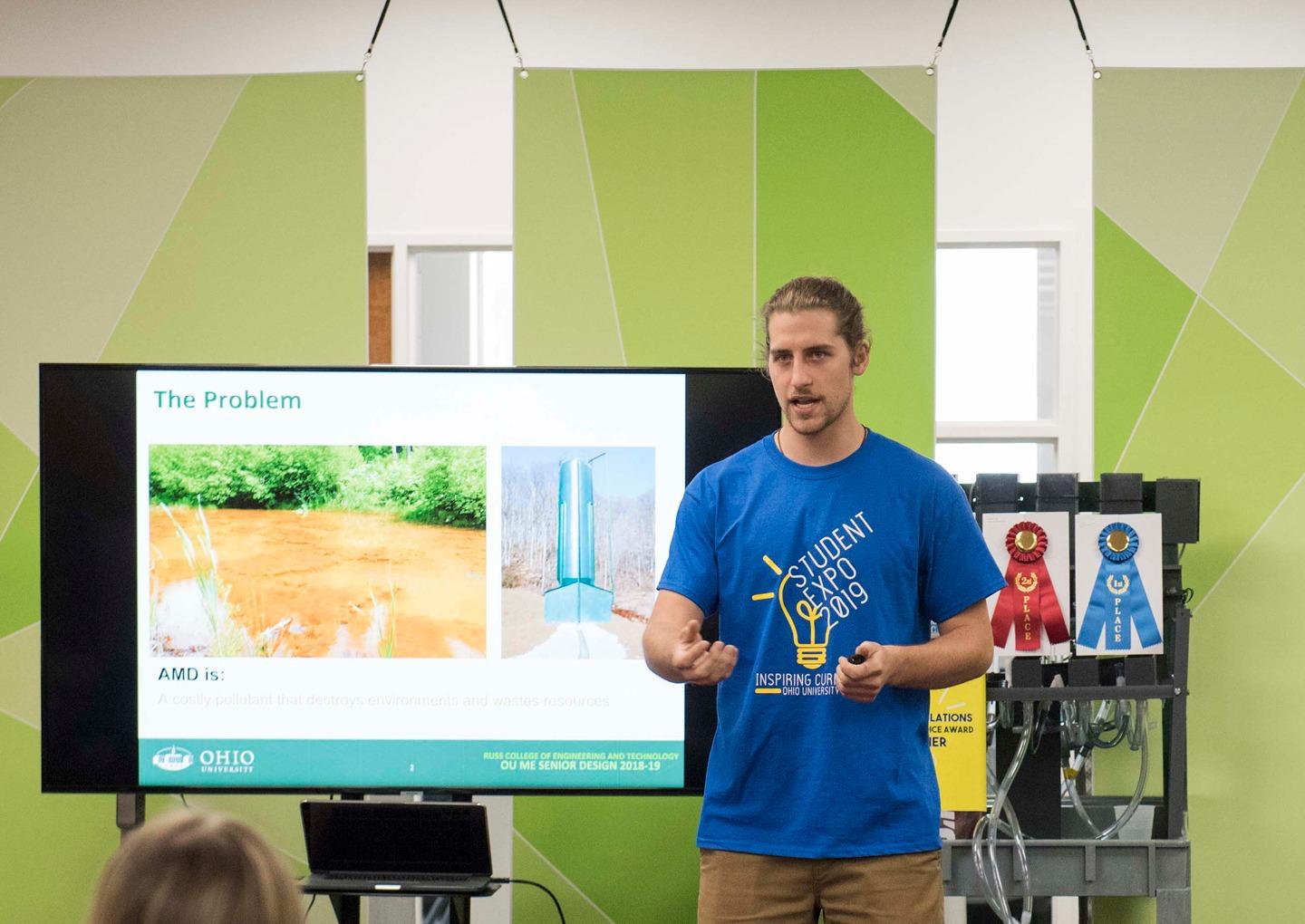
Drew Stroud, BSME ’19, presents his team’s work at the Center for Entrepreneurship’s 2019 Expo Pitch Competition, where students presenting work with commercial potential at the Student Expo pitch to a panel of judges for a chance to win cash. Photo by Alexandria Skowronski, BS, BSVC ’20
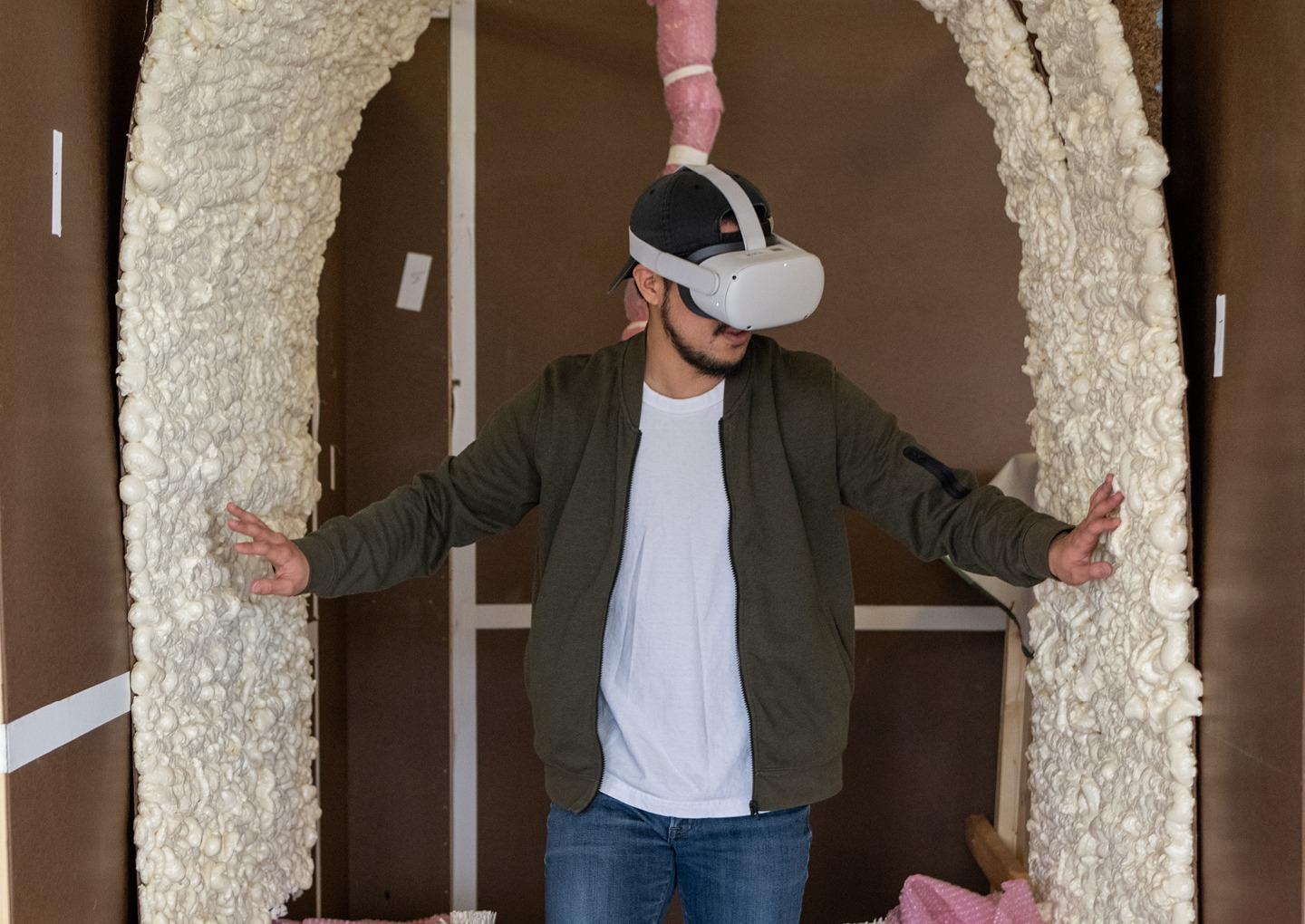
Yugo Naito, MFE ’21, experiences a mixed reality display at the 2022 Student Expo. Undergraduate and graduate students from the Scripps College of Communication created a sensory experience that imitated walking inside a whale. Photo by Ben Wirtz Siegel, BSVC '02

